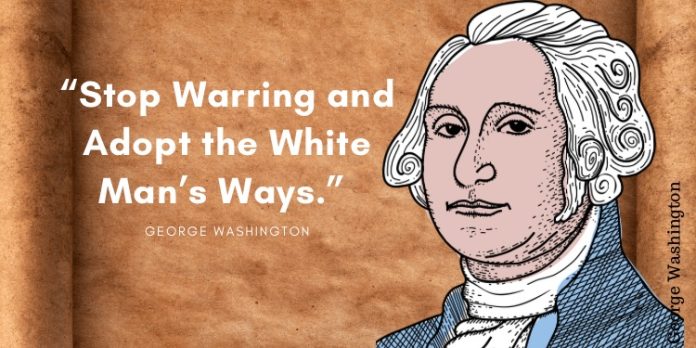George Washington: “Stop Warring and Adopt the White Man’s Ways.”
Sarah Wilson was a slave of a Cherokee and when the Emancipation order was delivered this slave owner did not want to tell her. When she found out about freedom she was severely beaten by the Cherokee “Ben.” The animosity between Native Americans and the Black Buffalo soldiers is another story. Both cultures faced a society that hated both. In American colonial society, some Native tribes were used as slave catchers and in efforts to appease the slave owning Europeans Native People adopted slave owning policies and wrote their own set of Black Codes. Black Mulattos also owned slaves. In fact, over 4,000 African American slaves were still being held on Native lands by many of the so-called “Civilized Tribes” as late as 1866, and as a result the federal government has to renegotiate new treaties to free Black people being held as slaves by certain Native Tribes. After the Civil War Black people had no means of support except to join the military and were used to commit acts of genocide against the Native population during an era dubbed the “Indian Wars.” Both were used against each other and both had their faults.
Evidence exists that some Buffalo soldiers refused to kill Native women and children and some deserted rather than engage in the killing. Some buffalo soldiers deserted the U.S. Army during the Mexican Revolution and joined in with Mexican revolutionaries against General Pershing in 1910. Both ethnic groups were victims of a racialized society that denigrated both cultures. However, there were many who sought to finds ways of undoing the plot to pit them against each other. We can find ways to address the disunity created under racist settler colonialism and the westward expansion of genocide and slavery.
The “Five Civilized Tribes” accepted white supremacist culture which principally meant slavery of Black people. The Choctaw, Cherokee, Chickasaw, Creek, and for a time the Seminole embraced slavery. The Seminole would eventually reject slavery as would some of the Creek Nation. The Cherokee were one of the worst in hatred of Black skin. The Cherokee Nation, but not all, adopted the slave laws of southern racists. The relationship between Native Americans and Black people involves complexities that have been exacerbated by colonialism that included genocide, ethnocide, and the ethnic divisions by those wishing to divide and create tensions between the two ethnic groups. The historical connections between the two cultures are illustrated by the use of both groups as pawns in slavery and the eventual expansion of slavery across the American continent. Sometimes, both groups rejected white supremacy and married. Buffalo Soldiers were used to eradicate Native resistance to oppression and some Native tribes often supported the slave owners and kept Black slaves while serving as slave catchers. These divisions were skillfully developed by European racists to prevent Native Americans from uniting with people of African descent.
The Cherokee Nation stripped citizenship from a majority of African-Americans who descended from slaves of wealthy Cherokee Indians before the Civil War.
In 1840 and in 1983, the Cherokee Nation revoked Black citizenship in the tribe. In 2007, the Cherokee tribe amended its constitution to restrict citizenship to only those with “Indian blood.” One must remember that no one is a “pure blood” as some claim and DNA evidence completely destroys that argument. Thousands of Blacks lost their rights until the change was reversed in 2021. One can trace white racist propaganda to George Washington who said that Native People should, “stop warring and adopt the white man’s ways.”








